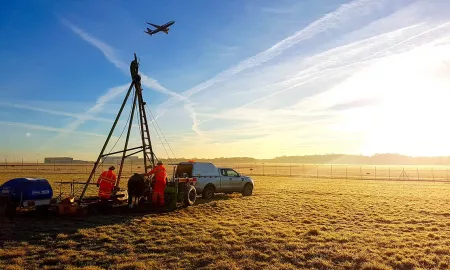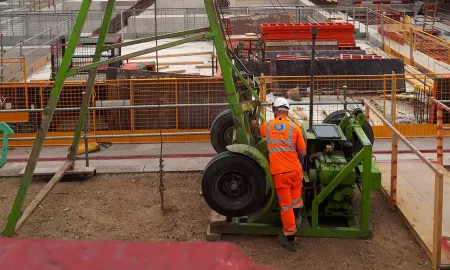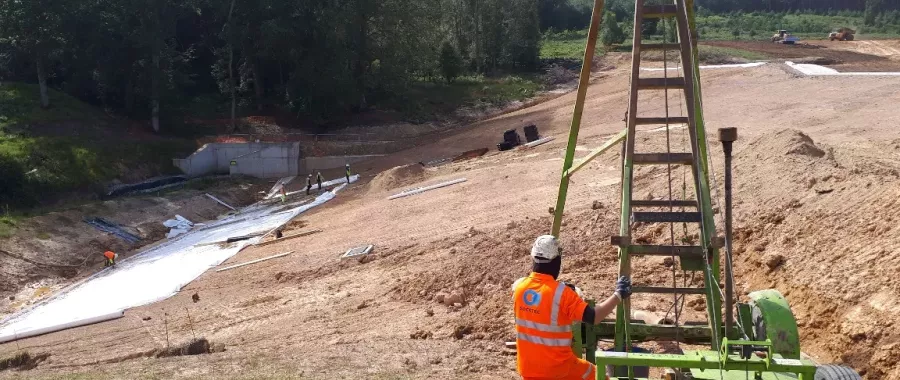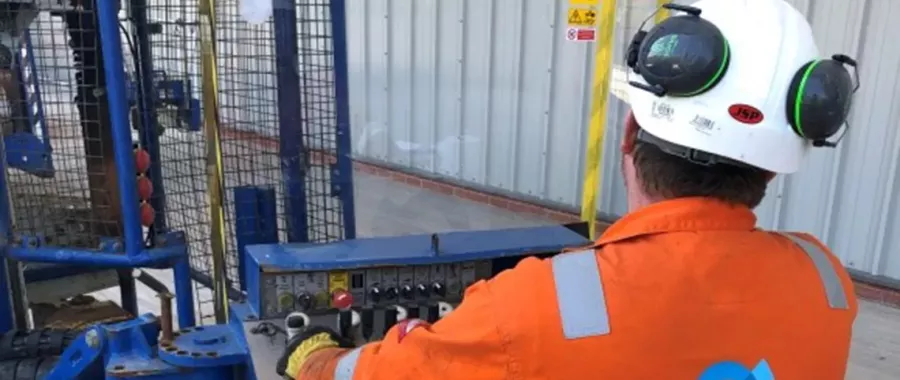Playing an integral part in the delivery of site investigation works, site engineers are responsible for ensuring the smooth running of every project, more often than not from start to finish.

In this blog, Peter Chester, geologist/site engineer within SOCOTEC’s Ground Investigation division, reflects on the high profile projects he has participated in, as well as discussing the importance of planning to overcome the range of challenges posed on site.
What does a typical day as a site engineer look like?
There is no such thing as a typical day for a site engineer. As with the majority of ground investigation projects, the nature of the work really does depend on the size of the job. Most days will start with a morning brief, where a plan for all of the activities taking place on site that day will be outlined and any information regarding site-specific hazards and general progress. This is an ideal time for the site team to raise any questions or observations they may have regarding the previous day’s work or the day ahead.
After the brief, a site engineer can find themselves dealing with a broad range of site activities, from logging samples, arranging sample collections and collating logs to receiving installation instructions, liaising with the client and dealing with issues regarding borehole progress. In a nutshell, a site engineer’s role is to ensure that the job is progressing as smoothly as possible.
What sorts of projects/sites have you worked on? Are there any that are of particular interest/high profile?
I have worked on all manner of projects in my time as a site engineer, whether this be a small or large site with single or multiple rigs and numerous other activities taking place at once. Most recently, I undertook a job for a water utility company based on the south coast, and this was a particularly high profile project which garnered plenty of media interest. From a nationwide perspective, I have also worked as a site agent for a major national infrastructure project, which has seen me undertaking works on sites up and down the UK.
On a side note, I also recently won a BDA award for the Safety Improvement/Innovation category following my development of the Work Front Safety Board, which was developed to act as a visual aid to assist with the communication of vital information on small, transient and remote work sites. This has enabled the Ground Investigation division to streamline site operations, ensuring that workers are always kept in the loop when it comes to any changes to staffing or health and safety taking place on each project.
What would you say is the most unique aspect of your job?
The most unique aspect of my role as a site engineer has to be the variation of work that it brings. Each site location comes with its own set of individual challenges, be it technical, health and safety, weather, ground conditions or productivity-related, no two sites are the same. However, the underlying challenge that remains synonymous with each project is ensuring that the overall progress and operations across the site are maintained, that the team is fulfilling the technical requirements of the project and that everyone is working in a safe, controlled manner.
Planning is therefore an essential part of my role, as although you cannot foresee every occurrence that may arise on site, you need to have a good idea of where the team needs to be at any given point in the project, as well as making sure that all members of the site team are equipped with everything they need to be able to carry out their role to the best of their ability.
How did you become a site engineer?
I completed a BSc in Geology at university, which equipped me with a firm foundation of theoretical and practical knowledge required to gain an entry level role into the geotechnical industry. My first graduate position was with the trading division associated with SOCOTEC 14 years ago, where I worked as an assistant engineer. Four years into the job, I decided to leave the ground investigation sector for a decade and worked in a completely different line of work. However, I returned to SOCOTEC in 2018 to take up my current role as a geologist/site engineer.
How does your role as a site engineer fit in with the broader project delivery?
As aforementioned, my role as site engineer is essential to ensuring the smooth operation of the overall project delivery. It’s about ensuring that SOCOTEC fulfils all the relevant aspects of the site works, such as technical and health and safety-related factors, all while maintaining day-to-day productivity to ensure that the project performs well financially.
What do you enjoy the most about your role? Are there any challenges that you have to overcome?
I have met some fantastic colleagues while working at SOCOTEC who are keen to support and help where needed, offering experience, expertise and advice in a range of difficult situations. Knowing that I have a strong support system behind me, I enjoy the challenge of making sure that each and every site team delivers a quality job carried out in a safe manner and kept within the promised deadlines. The unpredictable nature of site work in terms of ground conditions, weather and varying technicalities means that there are always a host of trials to overcome, so ensuring that we deliver safely and on time is a challenge in itself.
Do you have any advice for anyone looking to start a career as a site engineer?
The best advice I can give to anyone considering a career as a site engineer would be to not be afraid to ask questions and to get stuck in to as many different tasks and projects as you possibly can. This role can be extremely busy and hectic at the best of times, so keeping a level head and a focus on project delivery/the bigger picture is also important.
To find out more about SOCOTEC’s Ground Investigation division, contact us.
Want to find out more about SOCOTEC's site investigation services?

You might also like







Add new comment